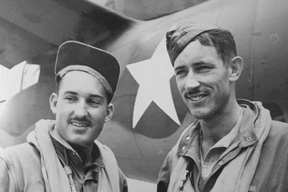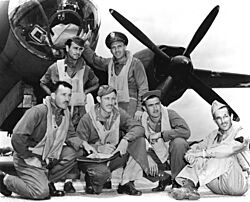James Muri facts for kids
Quick facts for kids
James Perry Muri
|
|
|---|---|

Muri (right) with 2d Lt Pren Moore in 1942
|
|
| Born | October 19, 1918 Carterville, Montana, U.S. |
| Died | February 3, 2013 (aged 94) Laurel, Montana, U.S. |
| Buried |
Miles City, Montana
|
| Allegiance | United States |
| Service/ |
United States Army Air Corps United States Army Air Forces United States Air Force |
| Years of service | 1938–1962 |
| Battles/wars | World War II *Pacific Campaign |
| Awards | Distinguished Service Cross |
| Spouse(s) |
Alice Anne Moyer
(m. 1941; died 2001) |
James Perry Muri (born October 19, 1918 – died February 3, 2013) was a brave American pilot during World War II. He was part of the United States Army Air Forces. His team helped protect Midway Island by attacking a large group of Japanese aircraft carriers.
Contents
Early Life and Training
James Perry Muri was born on October 19, 1918, in Carterville, Montana. He grew up on a ranch where his family raised cattle. After finishing high school in Miles City in 1936, he joined the United States Army Air Corps.
For two years, he worked as an aircraft welder. Then, he was chosen for flight training. He became a second lieutenant. At Langley Field, Virginia, he learned to fly a Martin B-26 Marauder plane.
Preparing for Battle
The day after Japan attacked Pearl Harbor, Muri and his unit moved to Muroc Army Airfield in California. They trained to fight in the Pacific Ocean. Seven months later, Muri and his team were sent to New Guinea, flying through Hawaii.
In Hawaii, Muri got his own Martin B-26 plane. He named it Susie Q, after his wife's nickname. Soon, his unit was sent to Midway Island.
Battle of Midway Attack
On the morning of June 4, 1942, during the Battle of Midway, a Japanese aircraft carrier group was seen near the island. Muri's unit had no special training for this mission. They only knew the location of the Japanese aircraft carrier Akagi.
On their way, Japanese Zero fighter planes attacked Muri's group. To avoid the enemy fire, they flew very low, only 200 feet above the water. This also helped them dodge the carrier's defensive guns.
Muri dropped his torpedo. Then, he flew directly over the Akagi to find a safer escape route. Japanese fighters and anti-aircraft guns fired at his plane. But they had to stop firing to avoid hitting their own ship. Muri's team did not hit any Japanese ships with their torpedoes. However, they shot down one Zero fighter. They also killed two sailors on the Akagi with machine-gun fire.
After the Attack
After the attack, Muri and one other B-26 pilot managed to land their planes safely on Midway Island. An inspection showed that Muri's plane had over 500 bullet holes. The left tire was shot off, and all propeller blades and major systems were damaged. Muri was allowed to cut the plane's name, Susie Q, from its side as a souvenir.
The Akagi was later attacked by other planes. It caught fire. The fleet commander, Isoroku Yamamoto, later ordered the ship to be sunk.
Later Military Career
For their brave actions, Muri and his crew received the Distinguished Service Cross. This is a very high award for military bravery.
Muri was then sent to Eglin Field, Florida. There, he started and led the 1st Proving Ground Torpedo Squadron. He soon became a Major. He commanded a detachment of the 353d Army Air Force Base Unit in Watertown, South Dakota. He also worked for the United States Department of State in Brussels, Belgium.
Personal Life
In 1962, Muri retired from active duty. He was a lieutenant colonel. He had served in the military for 24 years. He had flown planes for more than 5,000 hours.
In 1969, he and his wife, Alice, moved back to Bridger Creek, Montana. They later moved to Billings in 1999. His wife passed away in 2001. In 2003, Muri received the James Doolittle Award. James Perry Muri died on February 3, 2013, in Laurel, Montana, at the age of 94. He was buried at the veterans' cemetery in Miles City. He had two children, seven grandchildren, and six great-grandchildren.
 | Victor J. Glover |
 | Yvonne Cagle |
 | Jeanette Epps |
 | Bernard A. Harris Jr. |



